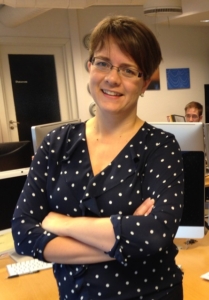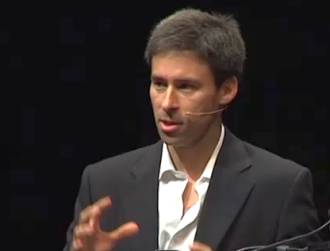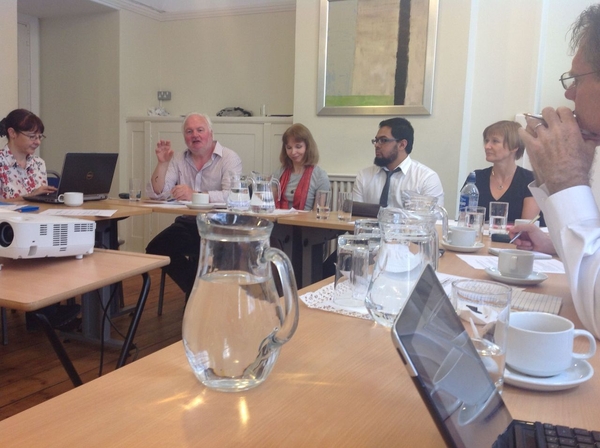مؤتمر أوروبي يبحث في الدين والهجرة وحالة المهنة

LONDON – Are some refugees visa Christians?
Is secularization inevitable in Europe? When is a new religious movement a cult?
These and other questions related to the challenge of covering the fast-changing realms of faith and migration were discussed by some of Britain and continental Europe’s leading religion journalists and scholars at an IARJ conference titled Diversity Rising.
In addition, the September 2014 conference provided a chance for the noted religion journalists to share experiences about effective ways to deals with editors, some of whom seek religion stories that will outrage audiences, rather than enlighten them.
The thorny ethical issues surrounding refugees and asylum seekers, especially those making religious declarations, were highlighted in the IARJ panel titled, Issues of religion and migration in Europe.
Participants heard about asylum-seekers’ claims of Christian conversion from two journalists who regularly cover religion: Elisa Di Benedetto, a freelance journalist from Italy, and Astrid Dalehaug Norheim, who works for the Dagen national newspaper in Norway.
Di Benedetto has been covering the often-horrifying situation from Sicily, writing about the tens of thousands of African and Middle Eastern refugees who have been travelling in smugglers’ boats across the Mediterranean Sea, including to the southern Italian island of Lampedusa.

The refugees arrive from everywhere from Algeria and Sudan to Syria and Gaza. Hundreds have drowned as they seek asylum in Europe. Many survivors, however, eventually hope to find a home not in beleaguered Italy, but in economically robust northern Europe and Britain.
Norheim has been covering the difficult issues surrounding refugees from Afghanistan, Iran and elsewhere who have been making their way to a potential new life in Norway and other parts of Scandinavia.
She recently researched groups of Somali Christians who had converted from Islam at various times — in Somalia, in Norway and in third countries on their way to Norway.
Many asylum-seekers in Europe from authoritarian Muslim-majority countries are telling refugee boards they are Christians, Norheim said, arguing they therefore cannot return to their countries of origin, where they would be persecuted.
The claims of such self-professed Christians are causing dilemmas for refugee board panels, which are having difficulty discerning the truth.
Some asylum seekers are drawn to Christianity in part because of the social services provided by European churches, both evangelical and Catholic, Norheim said. But there are reports some asylum-seekers who claim to be Christians end up attending Muslim mosques as soon as they obtain refugee status.
Refugee panel members are forced into awkward questions to try to discover if the asylum seekers are genuine Christians. They might ask about their knowledge of the New Testament or church doctrine.
But, as the journalists said, sometimes the claimants don’t know anything about the Bible, which can be true of many Christians. The claimants might just say they’ve found Jesus in their heart.
So it’s not much to go by.
For his part of the session on migration, Edmundo Bracho, a visiting lecturer at Westminster University, told the gathered journalists and scholars:
In terms of religion and immigration, two focal problems that the European media is facing in recent times are the moral panics towards immigrants from Albania, Bulgaria, and specially Rumania on the one hand; and on the other, the coverage of Islam in Europe under the globalized discourse of the
war on terror.
In a public IARJ evening session at The University of London, Birkbeck, Prof. Eric Kaufmann offered a challenge to those who believe secularization will eventually dominate in Europe.
Kaufmann projected that religious people will win the race against the non-religious in the 21st century.
Why? Basically because religious women are having far more babies than secular women.
While it’s partly correct to say many low-birth-rate Europeans and North Americans, and many ethnic Chinese, increasingly find religion unnecessary, Kaufmann said the larger global trend is that religious people are proliferating because of high fertility in the Middle East, Africa and South-East Asia.
The main reason Islam, Catholicism and conservative Protestantism is expanding is not necessarily because they’re converting newcomers, Kaufmann argued, but because their religions tend to be pro-natal
and they have more children.
What no one has noticed is that far from declining, the religious are expanding their share of the population: in fact, the more religious people are, the more children they have,
said Kaufmann, author of Shall the Religious Inherit the Earth? (Profile Books).
The cumulative effect of immigration from religious countries, and religious fertility will be to reverse the secularization process in the West. Not only will the religious eventually triumph over the non-religious, but it is those who are the most extreme in their beliefs who have the largest families.

Some critics, however, argue Kaufmann’s demographic projections are too adventurous – and that his focus on birthrates ignores the existential benefits of being part of a religious community or of having a transcendent worldview.
Barry Kosmin, a principal investigator of the American Religious Identification Survey, said in an interview after the London conference that no one can predict an upcoming U.S. election, much less patterns of religious growth and decline 30 years from now.
You can’t tell what’s going to happen,
said Kosmin, who is director of the Institute for the Study of Secularism in Society and Culture at Trinity College, Hartford, Connecticut.
The internationally noted specialist on new religious movements, sociologist Eileen Barker, emeritus of the London School of Economics, helped lead two sessions at the conference, in which she described the resources she has developed for journalists and other researchers.
As founder of the Information Network Focus on Religious Movements (INFORM), Barker described controversies she has run into as she strived to provide accurate and non-alarmist information on new religious movements, which are often called cults.
In a workshop in which the religion journalists shared the joys and frustrations of their vocation, Paul Vallely, a leading British writer on religion and ethics and author of Pope Francis: Untying the Knots, lamented how there is not a great deal of overlap between the values of the secular media and the values of Christianity.
Many metropolitan news editors believe religion is on the way out,
Vallely said. So they often seek stories about religious events and groups that are unusual or will outrage.
In contrast, Vallely said, Christianity and other religions tend to value situations in which peace and justice can be advanced. As a result, he said secular media outlets have often missed important signs of resurgent religion and spirituality in Europe and elsewhere.

on the way out,said Paul Vallely, a leading British writer on religion and ethics and author of Pope Francis: Untying the Knots. So editors often seek stories about religion that are unusual or will outrage. (To the right of Vallely: Kristine Pommert, head of Radio CTVC; Abdul-Azim Ahmed: editor On Religion Magazine)
